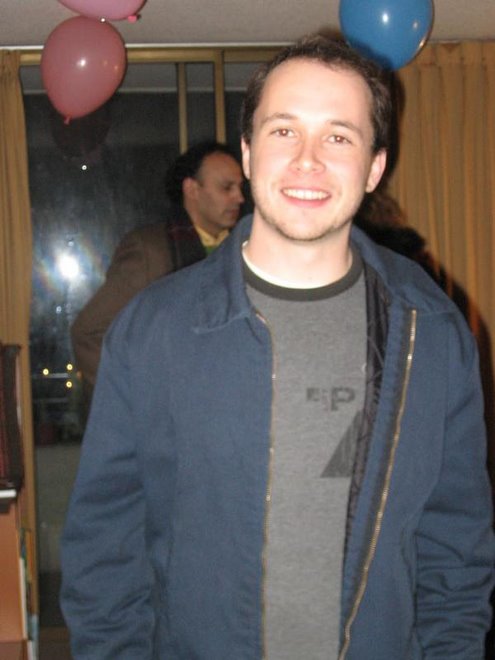 So how do you explain this photo, taken yesterday from the safe distance of my balcony, or these pictures, taken by the brave photographers at the El Mercurio newspaper, from right in the thick of things? Chile is seething right now with social conflict (although not at the level currently seen in Argentina, where truckers have blocked the highways and food has grown scarce in the supermarkets). None of these kids are bowing down to anyone, not even the police decked out in riot gear (revealing the fascist roots of the Chilean military) and ready for a fight.
So how do you explain this photo, taken yesterday from the safe distance of my balcony, or these pictures, taken by the brave photographers at the El Mercurio newspaper, from right in the thick of things? Chile is seething right now with social conflict (although not at the level currently seen in Argentina, where truckers have blocked the highways and food has grown scarce in the supermarkets). None of these kids are bowing down to anyone, not even the police decked out in riot gear (revealing the fascist roots of the Chilean military) and ready for a fight.The current protests are related to the famous protests of the elementary and high school students just about exactly two years ago--right at the beginning of Michelle Bachelet's presidential term--demanding better learning conditions. Their main demand was the repeal of a law known as the LOCE, the Ley Orgánica Constitucional de Educación, which basically privileges the right of private citizens to make money by running schools over the right of students to learn. In Chile, a large proportion of schools are funded by the public purse but privately run; but that doesn't mean that they are non-profit organizations. So people are making money by running schools with public funds, and under the LOCE, the government does not have much freedom to regulate the way students are taught at these schools, even though it pays for them. Meanwhile, fully public schools in Chile are of generally low quality, and--as in the US--municipally run, which means that the amount of funding they receive depends on how wealthy the tax base in their area is. This exacerbates the already rampant level of social inequality in Chile. Then as now, students were demanding better conditions in publicly funded schools, and the most radical of them are now demanding that privately-run, publicly-funded schools be prohibited from profiting off the government and the students they (selectively) enroll. The LOCE, by the way, was put in place by Pinochet, signed on his last day in office. The dictatorship's economic focus was often on privatization and this law was no exception.
So the government has responded with a new bill, the LGE, or Ley General de Educación, to replace the LOCE. It's currently being debated in Congress, and passed the lower house yesterday, thanks to an accord between the presidential administration and the right wing (keep in mind that President Bachelet is a socialist). The new law does not prohibit school owners from using government money to run their schools for profit, which is why students are protesting. Meanwhile, it imposes stricter regulations on teachers, which is why they're protesting. Basically, no one's happy. So the Carabineros police bursts onto the scene with their water cannons and their teargas, and arrest like 3,000 people per day (setting them free hours later...you can always see anxious parents waiting outside the police station the evenings after the protests for their kids to be processed). In Congress, one right-wing representative stated rhetorically that "if profit is a sin, let's all work for free," ironically defending the right of school owners to profit off their schools. A member of the teachers union, sitting up in the gallery, shouted back and challenged him to try making $500 a month, which is at the low end of teachers' salaries. [Members of Congress make approximately US$8,000 a month (senators make more); minimum wage in Chile is a bit over US$400 a month.] The members of the teachers union were escorted out after they began throwing ten-peso coins down to hit the representatives.
Chile is known as a country of consensus, thanks to the political climate that has generally prevailed in the years following the dictatorship, since the ruling Concertación coalition has continued the neoliberal policies introduced under Pinochet. Chile has become one of the most prosperous countries in South America, if not the most prosperous. And it is a relatively peaceful place.
However, I think it is simplistic, anachronistic and even unethical to deny Chile's tradition of social protest, as many do (such as analysts at the OECD) when expounding upon the country's "economic achievements." Assertions of this kind run the risk of whitewashing Chilean history for political and economic gain. There is plenty of evidence to the contrary, as well. This year the government commemorated the 100th anniversary of an uprising of nitrate miners in the northern region of Iquique, which was brutally put down by the police (all the miners were machine gunned to death). Also, there were many brave souls, about 3,000 in total, who lost their lives protesting against the dictatorship in the 70s and 80s.
It's quite inspiring to see these new generations of Chileans, who didn't grow up with their wings clipped by dictatorship, standing up for their legitimate rights, even at the risk of being considered conflictivos.

1 comment:
Excellent analysis, Carlos. You've said in a few paragraphs what most could not say in as many pages. And you help to explain why Chile is such a fascinating country (especially to Chile admirers like me who have yet to go!).
Susan
Post a Comment